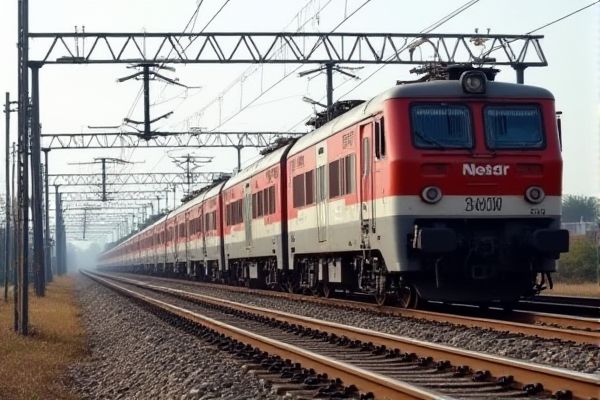
Kenya's railway sector is experiencing significant growth, creating numerous job opportunities across various areas. Positions are available in engineering, operations, management, and customer service, catering to a wide range of skill sets and educational backgrounds. The Kenya Railways Corporation and private entities often seek qualified professionals for roles involving maintenance, project management, and logistics coordination. Increased investments in rail infrastructure highlight the potential for career advancement and the importance of the railway in enhancing transportation efficiency in the region.
Job Description
Railway jobs in Kenya encompass a range of roles essential for maintaining and operating the country's railway infrastructure. Positions may include train operators, maintenance personnel, and administrative staff, each contributing to the efficiency and safety of rail transport. The growing emphasis on expanding the railway network offers numerous opportunities for individuals passionate about transportation and infrastructure development. Exploring these career paths can lead to valuable experiences in a vital sector for Kenya's economic growth.
Requirement
Railway jobs in Kenya often require candidates to possess a minimum of a high school diploma or its equivalent, depending on the position. Technical roles may demand further qualifications, such as a diploma in engineering or specialized training in railway operations. Experience in the transportation sector can be advantageous, especially for managerial or supervisory positions. Familiarity with safety regulations and operational procedures is essential for ensuring the efficient functioning of railway services in the country.
Salary and Perks Expected
Railway jobs in Kenya offer competitive salaries that vary based on roles and experience, with entry-level positions starting around KES 30,000 monthly and more specialized roles exceeding KES 100,000. Job holders often enjoy perks like health insurance, transport allowances, and opportunities for career advancement within Kenya's growing railway sector. The Kenya Railways Corporation frequently seeks skilled professionals, including engineers, technicians, and administrative staff, to support infrastructure development. Engaging in this field not only provides financial stability but also contributes to national development by improving transportation efficiency and connectivity.
Similar Job Names
- Train Driver
- Station Manager
- Railway Safety Officer
- Track Maintenance Technician
- Signal Technician
- Dispatcher
- Railway Operations Manager
- Infrastructure Engineer
- Fleet Manager
- Rolling Stock Maintenance Engineer
- Customer Service Officer
- Project Manager
- Electrician
- Plumber
- Civil Engineer
- Locomotive Engineer
- Rail Operations Analyst
- Foreman
- Construction Supervisor
- Safety Compliance Officer
Job Expectation Concept
Job expectations in Kenya's railway sector encompass a range of roles, from engineering and maintenance to operations and customer service. Professionals are expected to possess relevant qualifications, technical skills, and a commitment to safety and efficiency. Your ability to adapt to emerging technologies and sustainable practices is increasingly crucial, as the railway system continues to modernize and expand. Emphasizing teamwork and communication skills will enhance your effectiveness in meeting the growing demands of this vital industry.
Career Advantage and Weakness
Railway jobs in Kenya offer significant career advantages, including stability and competitive salaries that attract many job seekers. These positions often come with benefits such as health insurance and opportunities for professional development, enhancing your overall career growth. However, challenges exist, such as the potential for job insecurity due to economic fluctuations or changes in government policies. Additionally, the demanding nature of railway work may require long hours and adaptability to various work conditions, which can be a downside for some individuals.
Important Thing Must Know
Railway jobs in Kenya, particularly with the Kenya Railways Corporation, offer numerous opportunities in various fields such as engineering, operations, maintenance, and administration. The ongoing modernization and expansion of railway infrastructure, including projects like the Standard Gauge Railway, create a growing demand for skilled professionals. Positions often require specific qualifications, including technical training or relevant degrees, making it essential to align your skills with industry needs. Nairobi serves as a central hub for railway operations, providing accessible locations for job seekers. Staying informed about recruitment drives and networking within the industry can significantly enhance your chances of landing a position.
Alternative Career Options
Exploring alternative career options beyond traditional railway jobs in Kenya opens various promising avenues. You may consider roles in logistics management, which are essential in ensuring efficient transport of goods across the country. Opportunities in urban planning and infrastructure development also play a crucial part in enhancing the rail network and public transit systems. Engaging in customer service or tourism-related occupations linked to train travel can offer rewarding experiences while contributing to the growth of the railway industry in Kenya.
Companies List
- Kenya Railways Corporation
- Kenya Ports Authority
- Standard Gauge Railway (SGR)
- Transcom Kenya Limited
- Kenya Pipeline Company
- Kerio Valley Railway
- East African Railways
- Progress Rail Services Kenya
- Afristar Railway Management
- Softran Limited
List of Ideal City
Nairobi is a prominent city in Kenya, known for its extensive railway network and numerous railway job opportunities. Mombasa, as the country's main port, also offers positions related to railway operations and logistics. Kisumu, located near Lake Victoria, is focusing on enhancing its railway infrastructure, creating jobs in the sector. Nakuru, with its growing transport links, presents potential employment options within the railway industry.
 jobs-kenya.com
jobs-kenya.com